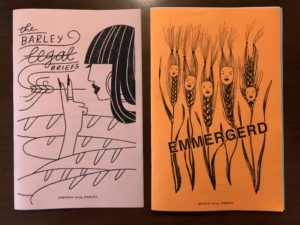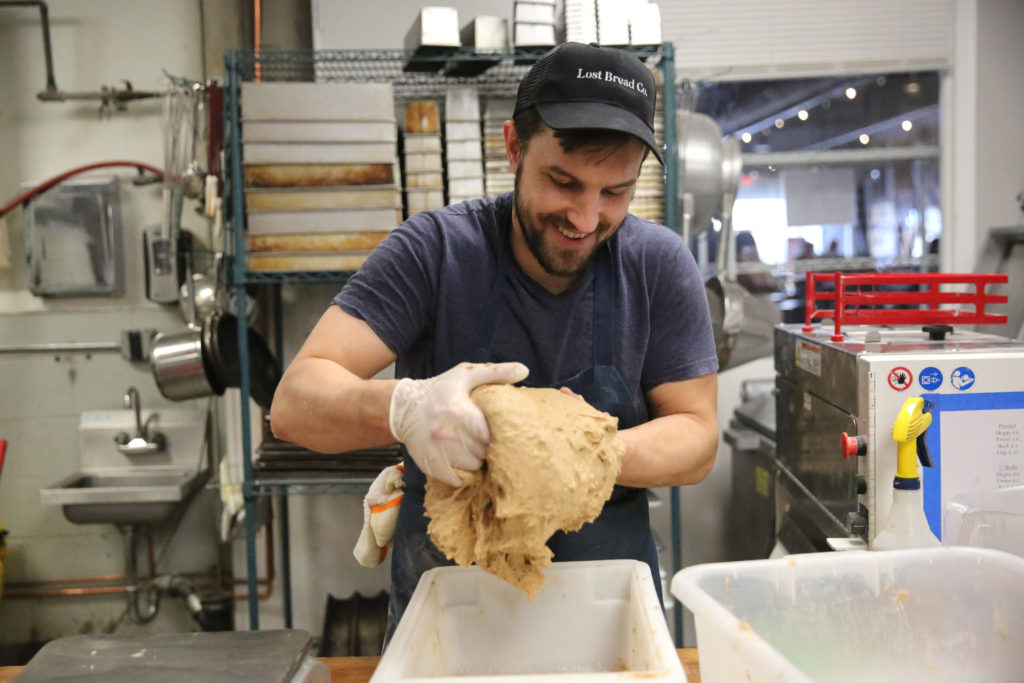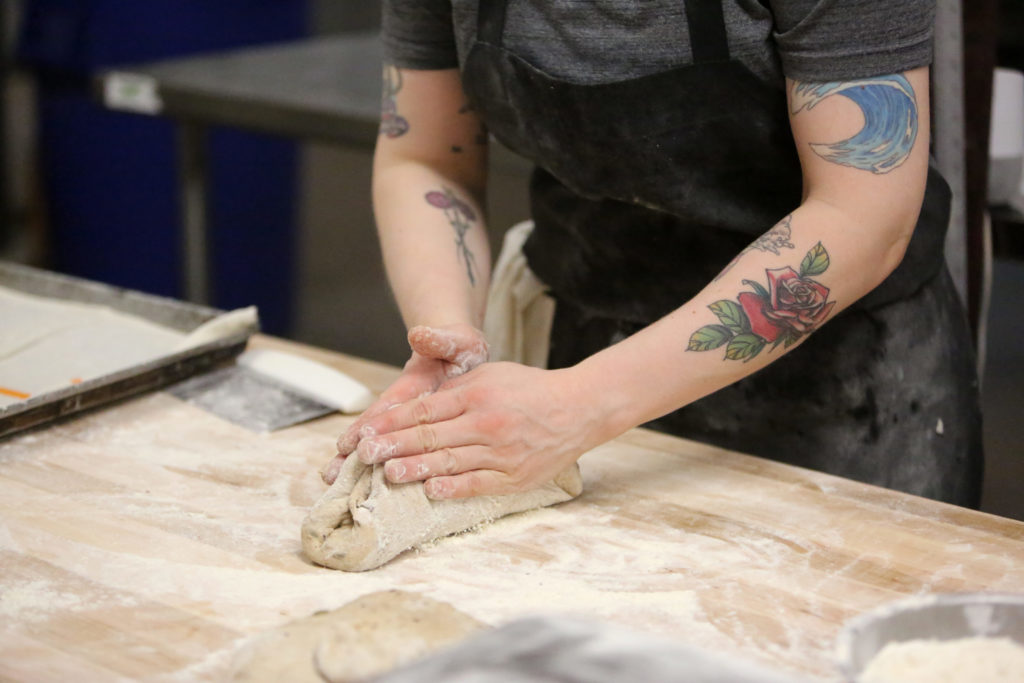Foodizen: Breaking Bread
Foodizen: Breaking Bread
The next in a series on the nexus of food and culture explores Philly's new wave of sustainable, socially-conscious bakeries at the forefront of modify
Apr. 04, 2019
We conspicuously sympathize bread'southward importance equally a building block of civilization, its symbolic axis to the world's religions, and its contribution to human nutrition. Withal bread, for most people, is not a terribly exciting topic.
"Bread is incredibly important," says Alex Bois. "On the other hand, it's fucking staff of life, mundane and unimportant. It's a functional part of the meal. It'southward filler."
It is a little surprising to hear Bois speak of bread in these terms. His company, Lost Bread Co. , is one of several in Philadelphia which has made bread very heady and very important. His social-justice business goals—living wages for workers, waste reduction, and the focus on milling local organic grains—offers a shining model for food companies hither and effectually the state.
Lost Bread'south social-justice business concern goals—living wages for workers, waste matter reduction, and the focus on milling local organic grains—offers a shining model for food companies here and around the country.
But Bois' arroyo shows that baking bread the correct fashion can also be fun. Forth with the expected multi-grain, Italian-mode pane da tavola and deli rye, are creative breads like cranberry pepita, olive citrus, and a rye made with roasted beets. The freshly-milled ancient-grain flour creates a depth of flavour unlike that of other loaves. And then at that place's Lost Staff of life's preztel shortbread—made sustainably with leftover sourdough pretzels—which was called " The Cookie of the Future " by Food & Wine and last calendar month was named New York City's " Best Cookie ."
![]()
Lost Bread'south amazing monthly grain share introduces customers to products made with lesser-known ancient grains (March was emmer; April is spelt), along with fun monthly classes to teach customers how employ the grains in their own baking. (In March, Pasta Lab was invited in to teach students how to brand emmer pasta). The Grain Share also includes a humorous 'zine devoted to the monthly grain with gee-whiz history, puns, and recipes—January'due south championship: "The Barley Legal Briefs"; March'due south title: "Emmergerd" (think " ermahgerd ").

"Grain Share is about awareness," Bois says. But sourcing grain hasn't been like shooting fish in a barrel. "When I showtime got to Philly, it was damn almost impossible to detect local grain," Bois says. Whole grains should be much cheaper than candy, commodity white flour, Bois insists. Just the cost of white flour is held artificially low. "Nosotros don't desire to cede control to large companies," he says. Last year, Lost Staff of life bought over twoscore,000 pounds of grain from Mid-Atlantic farmers.
Creating a demand for alternative grains is mode to preserve them and too to help grain farmers diversify for the future, every bit climate changes and other pressures mount. "It's about the rich tapestry of how grain and bread supports the evolution of society," Bois says.
"Bread feels so far behind other gourmet categories," Merzbacher says. "When I started, I asked, 'Can I take coffee and arts and crafts beer and utilize those ideas to staff of life?'"
Lost Bread, which opened in 2017, is part of a small-but-growing movement of socially-enlightened breadmaking in the city. Information technology's also an example of adept ideas coming from outside the city.
Bois came to Philadelphia in 2013 from New York, when he took a task with Ellen Yin and Eli Kulp as they were opening High Street on Market. Bois' bread programme was among the highlights at the acclaimed Loftier Street. Only in fall, 2016, Bois left. "The restaurant industry has a tendency toward exploitation," he says. "In that location'southward a lot of ills overlooked or accepted."

Instead, he set out to create a business model in which he could offer to pay a minimum of $15-per-hr living wage. He now has nine total-time employees, with a tenth before long to start. The bakery recently moved into a large infinite at Craft Hall on Delaware Artery, where Bois mills his own grain.
![]()
In lodge to back up that model, Lost Breadstuff has sought to become more than than a tiny, gourmet, mom-and-pop. It's not all but high-stop cranberry-and-pepita loaves. The daily bread is essential to the business concern. At High Street, Bois was selling breadstuff at $x-$12 per loaf. Lost Bread is now around $5-$seven per loaf. "Nosotros knew a bakery like this wouldn't work without scale," he says. "Maybe it begins a luxury, but it begins to drain into the fabric of everyday life. We want to be able to sell an affordable loaf of staff of life that'south tasty enough to get someone to consume whole grain."
Lost Breadstuff isn't the merely breadstuff bakery looking to sell socially-witting bread at scale. At that place's also Fikira Bakery 's bread share CSA, run by 1149 Cooperative co-founder Ailbhe Pascal. And then there's Bois' friend, Pete Merzbacher, who owns Philly Bread , too started baking staff of life with goals of sourcing local flour and grain (he also came to Philly from elsewhere, in his case the Boston area). Famous for his Philly Muffin, a take on the English muffin, Merzbacher has called bakery locations in neighborhoods of the metropolis that need new retail and job opportunities.

Merzbacher, who launched his business organisation with a loan from Judy Wicks's Circumvolve of Aunts and Uncles , began baking in 2013 in a vacant storefront on revitalizing North Fifth Street. Recently he's opened a larger bakery, with 14 employees, in the midst of Wayne Junction'due south revitalization.
![]()
"Scale and quality are non incompatible," Merzbacher says. "Breadstuff feels so far behind other gourmet categories. When I started, I asked, 'Tin I have coffee and craft beer and employ those ideas to bread?'"
That the reply, clearly, is aye, seems a sign of the times. Philly has ever been a bakery town—beyond the Southward Philly staples of Amoroso's and Sarcones, we have enjoyed first-wave artisan breadmakers like Metropolitan Baker since the early on 1990s. Like coffee, bread is finally having its second moving ridge, in a way that is truly Philly. This is, increasingly, a place for experimentation, not just around flavors and restaurant concepts, but also sustainability, social consciousness and equity. How perfect, then, that it can all come together in the next loaf y'all pick up?
Jason Wilson is The Citizen's 2022 Jeremy Nowak Fellow, funded by Spring Betoken Partners, in honor of our belatedly chairman Jeremy Nowak. He is the author of iii books, including most recentlyGodforsaken Grapes, series editor ofThe Best American Travel Writing, and writes for the Washington Postal service, New York Times, New Yorker and many other publications.
Lost Staff of life founder, Alex Bois. Photography by Anthony Pezzotti 



littletonwheme1992.blogspot.com
Source: https://thephiladelphiacitizen.org/foodizen-breaking-bread/
0 Response to "Foodizen: Breaking Bread"
Post a Comment